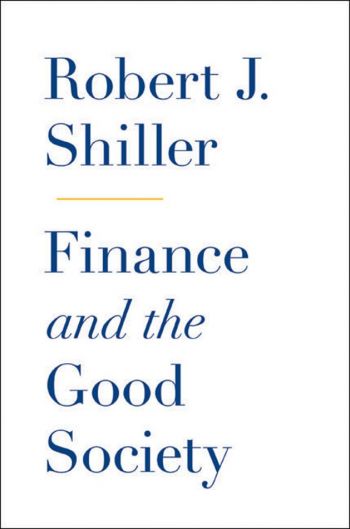Good press for finance, for a change
Book Review: Author argues finance can be force for good in tough times
- |
- Written by Matthew Boutte
- |
- Comments: DISQUS_COMMENTS
 Finance and the Good Society, by Robert J. Shiller. Princeton University Press, 288 pp.
Finance and the Good Society, by Robert J. Shiller. Princeton University Press, 288 pp.
Dr. Robert J. Shiller, he of the S&P/CaseShiller Home Price Index, has written a new book that he describes as originally being for his students. Intended as a survey of the landscape of modern finance and an argument for finance's fundamental benefits to society, it is in fact, an apologetic for the financial industry itself.
That's both a good thing and a bad thing.
In today's social climate the financial and banking industries have been so vilified, it's refreshing to have someone--especially someone of the stature of this Yale University professor--stand up for those of us in the industry. On the other hand, Dr. Shiller is so heavy-handed with his praise and defense of the industry that at times it feels like he is "over selling."
Nevertheless, bankers will appreciate the book for not taking the familiar stance that we're all crooks.
A financial critique, with a surprise
Finance and the Good Society consists of two parts. Each chapter in Part One focuses on a different occupation found in modern finance. For example, this section opens with a chapter on CEOs, defending the role as a challenging one that is subject to many pitfalls as varied as short-term versus long-term focuses and, of course, the difficulties of CEO compensation.
Other occupations included in subsequent chapters include investment managers, bankers, investment bankers, mortgage lenders and securitizers, traders and market makers, and lawyers and financial advisors, to name but a few.
Given Dr. Shiller's background I found it fascinating that he directs some of his harshest criticism to educators.
Dr. Shiller states: "Errors by educators in recent decades seem to have played an important role in the severe financial crisis that began in 2007. In particular, the efficient markets theory was oversold to students, and this helped contribute to the formation of speculative bubbles. Many teachers seem to inculcate the extreme view that markets are perfectly efficient. From this view many of their students drew the conclusion that it hardly matters ethically what one does in business, since nothing one could do would ever disturb this magnificent equilibrium."
| In the author’s words… “The financial system conforms to a large degree to financial theory, which has a sort of beauty that can inspire minds, but also a sort of ugliness, at least in its present form. The financial crises that we experience from time to time are only part of the story. That ugliness can provoke some to dismiss the whole concept of financial capitalisim. But it would be foolish to do so, for that would cost us the ability to accomplish some of our most cherished goals. The history of the economic development that has brought the world to its current state of prosperity and enlightenment is a history of many technical adjustments to our financial system, of innovations inspired by financial theory but also based on realistic assessments of human nature.” —Dr. Robert Shiller
|
||
I realize this is hardly a scathing indictment, but given the tone of the rest of the book, it is surprisingly blunt.
Part Two of the book is entitled "Finance and Its Discontents" and this is where most of the meat is. If Part One was intended to enrich undergraduate business students, Part Two is a graduate-level discourse on such wide ranging topics as "Categorizing People: Financiers versus Artists and Other Idealists" to "Debt and Leverage" to "Speculative Bubbles and Their Costs to Society."
In these chapters Dr. Shiller engages in something of a one-man version of the Socratic Method, wrestling with a topic and viewing it from all sides. Many times I found myself disagreeing with Dr. Shiller's conclusions, seeing them as too academically focused or too removed from the practitioners. Still, what he accomplished, like any good professor, was to make me think about the issues.
Where this section fell short for me is that too many times Dr. Shiller concludes a chaptb
If you'd like to review books for our online book column, or have recently read a book that you found helpful that we haven't already reviewed, please e-mail [email protected]
Want more banking news and analysis?
Get banking news, insights and solutions delivered to your inbox each week.
Tagged under Books for Bankers,













